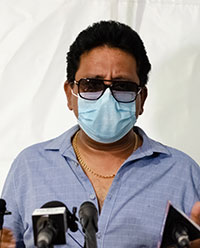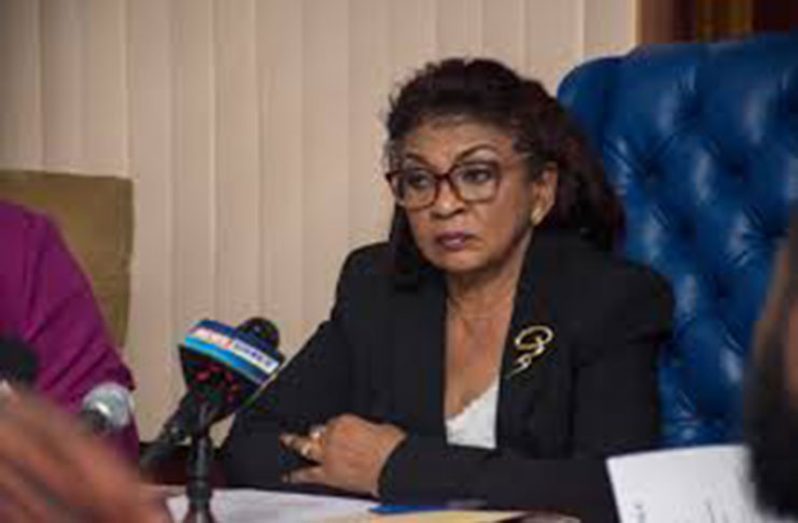…PPP/C objects to GECOM probing claims
EVEN as the alleged cases of irregularities in the General and Regional Elections climb to more than 86, 000, the People’s Progressive Party/Civic (PPP/C) is up in arms against the decision of the Guyana Elections Commission (GECOM) to receive supporting evidence from the A Partnership for National Unity + Alliance for Change (APNU+AFC).

On Saturday, the ruling APNU+AFC contended that of the votes recounted to date, 86,367 lack credibility as it pointed to cases in which Poll Books and the Official List of Electors (OLEs) were missing when the ballot boxes were opened. Of the 86,367 votes, the coalition is contending that 31,958 of them are affected by the variance on the OLEs.
In light of the mountain of allegations, the Chair of GECOM, Justice (Ret’d) Claudette Singh, has invited the APNU+AFC to formally submit evidence in relation to their objections, particularly as it relates to deaths and migration. “The submission of evidence would inform the deliberations at the level of the Commission,” Justice Singh said in a correspondence to the APNU+AFC.
PPP perturbed
But this did not sit well with the PPP/C. In an interview with reporters on Saturday, on the outskirts of the Arthur Chung Conference Centre (ACCC), PPP/C Executive Member, Anil Nandlall, dubbed the move by GECOM as illegal, while arguing that the Order, which triggered the National Recount, only provides for a numerical recount of the ballots cast during the March 2 General and Regional Elections.
“Anytime GECOM goes outside of the scope of that recount, GECOM will be exceeding its jurisdiction, GECOM will be acting without jurisdiction, GECOM will be acting ultra vires and GECOM will be violating the very order that GECOM published and undertook to be governed by,” Nandlall told reporters. According to him, the Order does not provide for certain anomalies (allegations of ghost voters and migrants) to be made much less the provision of evidence to support such claims. In arriving at his position, the PPP/C Executive relied heavily on the Representation of the People Act, though the Official Order, gazetted on May 4, makes no direct reference to that legislation as it relates to the procedure to be employed during the recount.
According to the Order, the National Recount is being executed by the Elections Commission under Article 162 of the Constitution and Section 22 of the Elections Law (Amendment) Act of 2000.
The final clause in the Order states: “AND WHEREAS the Guyana Elections Commission, in exercise of the authority vested in it under Article 162 of the Constitution and pursuant to Section 22 of the Elections Laws (Amendment) Act, No. 15 of 2000, seeks to remove difficulties connected with the application of the Representation of the People Act, Chapter 1:03, in implementing its decisions relating to the conduct of the aforementioned recount of all ballots cast at the said elections, including the reconciliation of the ballots issued with the ballots cast, destroyed, spoiled, stamped, and as deemed necessary, their counterfoils/stubs; authenticity of the ballots and the number of voters listed and crossed out as having voted; the number of votes cast without ID cards; the number of proxies issued and the number utilised; statistical anomalies; occurrences recorded in the Poll Book.”
Notwithstanding the provisions provided for in the Order, the PPP/C remains adamant in its position that cases of alleged anomalies should not be entertained by GECOM. According to the APNU+AFC, there are more than 1,600 cases of anomalies in which there are missing Certificates of Employment, dead voters, migrant votes, unstamped ballots and missing Oaths of Identities or Affidavits among others. But according to Nandlall, there are not issues for which GECOM can address under the order. “The Chairperson is now expanding the scope of this recounting exercise, far outside of its parameters, and that is wrong. It is unlawful,” he iterated.
Referencing to Article 163 of the Constitution and National Assembly (Validity of Elections) Act, Nandlall argued that “any allegation of an unlawful act or omission,” ought to be dealt with exclusively by High Court via an Elections Petition. “The Constitution, our Supreme Law does not invest in GECOM the power to investigate allegations, to hear allegations, to prove and disprove allegations of the type that are being made.
Those are issues that the Constitution vests in the preserve of the Judiciary exclusively, and it must be ventilated in accordance with the provisions of the National Assembly (Validity of Elections) Act, and the procedural vehicle to be used is an Elections Petition,” Nandlall submitted. According to him, the PPP/C will be writing the Chair of the Elections Commission to express its objection. Will the party move to the court if it doesn’t get a favorable response? Nandlall said it will “cross that bridge when it gets there,” but did not rule out the option.
Notably, in the case of Ulita Moore v The Guyana Elections Commission, which brought into question a decision by GECOM to facilitate a recount, Chief Justice Roxane George-Wiltshire acknowledged the “wide powers” given to Elections Commissioner under Article 162 of the Constitution, so as to ensure an impartial and fair elections process.
Article 162 (1) (b) states that the Guyana Elections Commission “shall issue such instructions and take such action as appear to it necessary or expedient to ensure impartiality, fairness and compliance with the provisions of this Constitution or of any Act of Parliament on the part of persons exercising powers or performing duties connected with or relating to matters aforesaid.”
The Chief Justice was also keen on noting that Section 22 of the Elections Law (Amendment) Act is among provisions that operationalize the powers and functions of GECOM as mandated in Article 162. Importantly, she said, Section 22 permits GECOM to address any difficulty encountered during the execution of its mandate.
Section 22 states: “If any difficulty arises in connection with the application of this Act, the Representation of the People Act or the National Registration Act or any relevant subsidiary legislation, the Commission shall, by order, make any provision, including the amendment of the said legislation, that appears to the Commission to be necessary or expedient for removing the difficulty; and any such order may modify any of the said legislation in respect of any particular matter or occasion so far as may appear to the Commission to be necessary or expedient for removing the difficulty.”




.png)









